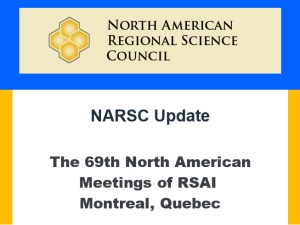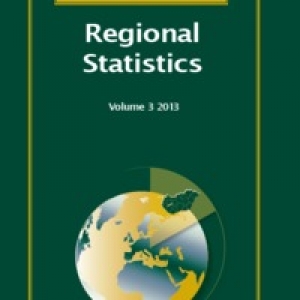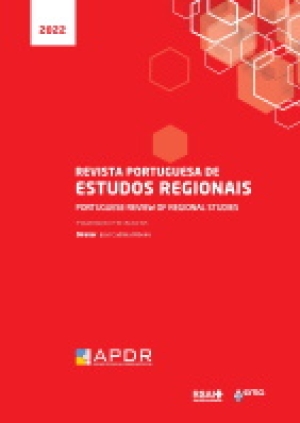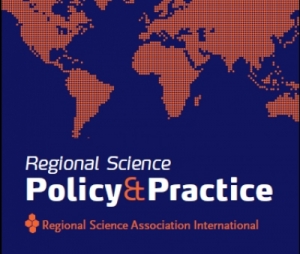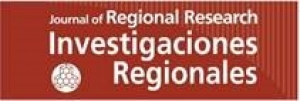News
Elisabete Martins
NARSC Nominations and Hotel Reservations
|
|||||||||||||||||||||||||||||||||||||||||||||
|
ERSA Monthly E-news - September 2022
|
Open rank tenured/tenure track position, Urban Land/Housing Economics in Planning at UC Berkeley
The Department of City and Regional Planning at the UC Berkeley is seeking applications for an open rank (Assistant, Associate, or Full Professor) faculty position in Urban Land/Housing Economics with an expected start date of July 1, 2023.
The successful candidate must have the vision and drive to chart new intellectual territory, be committed to developing and/or participating in initiatives and multidisciplinary collaborations that expand the reach and impact of their research, conduct externally-funded research, contribute to the department's efforts to promote diversity and inclusion in higher education, and demonstrate a strong commitment to excellence in teaching, service and research.
To apply go https://aprecruit.berkeley.edu/JPF03622.
Please see attached for further details.
RSAI-BIS Early Career Colloquium - 3-4 November 2022
Dear all,
Our popular Early Career Colloquium is returning as an online event, taking place on 3-4 November 2022. This is a great opportunity for PhD students and early career researchers within 3 years of their PhD to present and discuss their work with experienced academics in their field. We welcome students *at any stage* of their PhD. First-year PhD students are strongly encouraged to apply, and may present research plans or work in progress.
Attendance at the colloquium is *free* for accepted presenters. We would also encourage more established RSAI-BIS members to attend the sessions, and contribute with comments and suggestions. From past experience, we have found this to be a very helpful and fulfilling experience for both presenters and attendees.
A panel of judges will award prizes for the best paper and the best presentation. Prize winners will receive a certificate, and will be entitled to attend our 2023 annual RSAI-BIS conference (in Newscastle, 4-6 July 2023), for free. The prize covers fees, accommodation, and economy-class travel. Shortlisted candidates will also receive a certificate, and their first drink at the 2023 annual conference will be on us.
To apply, please submit a short abstract by the 17th October 2022, using this link: https://www.rsai-bis.org/early-career-22-colloquium.html. The Colloquium is aimed at early career researchers working in the fields of regional and urban economics, environmental policy, economic geography, political geography, planning, and all related fields.
Presenters who wish to be considered for the best paper prize will be expected to submit a full paper by the 28th October 2022.
We hope to see you all there!
Organising committee (Daragh O'Leary, Richard Rijnks, Matt Lyons, Maria Abreu) and RSAI-BIS Committee.
The Annals of Regional Science, Volume 69, Issue 2 - New Issue Alert
|
|
|
|||
|
|
|
|||
|
|
|
|||
|
|
|
|||
|
|
|
|||
|
|
|
|
|||
|
|
|
|||
|
|
|
|||
|
|
|
|
|||
|
|
|
|
|||
|
|
|
NARSC 2022 Conference
|
||||||||||||||||||||||||||||||||||||||||
|
The New Issue of Regional Statistics is already Available! (2022, VOL 12, No 4)
THE NEW ISSUE OF REGIONAL STATISTICS IS ALREADY AVAILABLE!
We are pleased to inform you that a new issue of the Regional Statistics has been released and now it’s avaiable online.
https://www.ksh.hu/terstat_eng_current_issue
REGIONAL STATISTICS, 2022, VOL 12, No 4.
STUDIES
Vahide Bulut – Serdar Korukoglu: Surface curvature analysis of bivariate normal distribution: A Covid-19 data application on Turkey
https://www.ksh.hu/statszemle_archive/regstat/2022/2022_04/rs120401.pdf
Zoltán Birkner – Ádám Mészáros – István Szabó: Handling regional research, development and innovation (RDI) disparities in Hungary: New measures of university-based innovation ecosystem
https://www.ksh.hu/statszemle_archive/regstat/2022/2022_04/rs120402.pdf
Hasan Engin Duran – Burhan Can Karahasan: Heterogenous responses to monetary policy regimes: A regional analysis for Turkey, 2009–2019
https://www.ksh.hu/statszemle_archive/regstat/2022/2022_04/rs120403.pdf
Senanu K. Klutse – Gábor D. Kiss – Judit Sági: Exchange market pressure in Sub-Saharan African countries – The role of imports and short-term external debt, 2002–2017
https://www.ksh.hu/statszemle_archive/regstat/2022/2022_04/rs120404.pdf
András Bethlendi – Katalin Mérő: Measuring shadow banking in Central and Eastern European countries: A new dataset, 2004–2019
https://www.ksh.hu/statszemle_archive/regstat/2022/2022_04/rs120405.pdf
Tamás Dusek – Miklós Lukovics: The impact of a low-cost airline’s flights on local economy – On the example of Cluj-Napoca International Airport (Romania)
https://www.ksh.hu/statszemle_archive/regstat/2022/2022_04/rs120406.pdf
Tamás Sikos T. – Dóra Szendi: Evolution of smart village models in Hungarian Abaúj micro-region
https://www.ksh.hu/statszemle_archive/regstat/2022/2022_04/rs120407.pdf
Levente B. Alpek – Zsuzsa M. Császár – Ábel Dávid Tóth – Klára Czimre: Impacts of the international students’ consumption expenditures on the national economy in Hungary,
2020
https://www.ksh.hu/statszemle_archive/regstat/2022/2022_04/rs120408.pdf
Join us to our social networking sites:
Revista Portuguesa de Estudos Regionais/Portuguese Review of Regional Studies: issue N. 62 (2022) published
It is a pleasure to inform you that the issue n. 62 (September 2022) of our journal (Revista Portuguesa de Estudos Regionais / Portuguese Review of Regional Studies) is now available online. You can accede to the issue using the following link: https://review-rper.com/index.php/rper/issue/view/62
Thank you for contributing to the success of the journal. We will go on counting on you!
RSPP Call for Papers | Special Issue on Social economy and entrepreneurship in urban and local development - Theory, policy and practices of community engagement
Special Issue proposal for “Regional Science Policy & Practice”
Social economy and entrepreneurship in urban and local development - Theory, policy and practices of community engagement
Guest Editors:
Social economy and social entrepreneurship are no longer just an alternative development perspective or a symbolic, ethical or solidarity issue of the contemporary world. Social involvement in various spheres of communities, economy, or ecology is becoming more and more real and meaningful in urban and local policy and development. The term development means not only progress in the sense of a market economy but development as an increase of spaces of socioeconomic-ecological synergy, social and institutional trust, economics of inclusion, equality and equilibrium in all aspects of humanity.
We observe emerging critical currents as part of the theory and practice of entrepreneurship, business models innovation, (global) value chains and local economic (eco)systems. These evolving concepts in conjunction with prevailing uncertainty caused by epidemic threats, humanitarian crises, energy challenges, or environmental changes must result in ever faster socioeconomic development’s paradigm shifts. The concept of development should increasingly mean responsible transformation of existing lifestyles, social and business practices, and local and urban policies and planning.
Catalysts for changing existing paradigms include the emergence of social economy and social entrepreneurship as a conceptual-material frame for engaging local communities in real transformative activities for creating social values. These social and institutional practices are often linked to the level and specificity of social capital, cultural capital or habitus in Bourdieu's approach. The progression of community engagement in urban and local development in various entrepreneurial forms is also determined by inter-institutional play and organizational field structures in terms of DiMaggio and Powell's conceptualization.
In different parts of the world, there are different types of prevailing problems and different, often specific, ways of solving them. Increasingly, the potential and power to solve these challenges is linked to the level of community activism, in correlation with cultures of social practices, policy, and territorial governance.
This compels scientific exploration, which increasingly needs to be interdisciplinary, innovative and stereotype-breaking. The purpose of this special issue is to present innovative and/or critical research on the multi-level relationship between the emergence of social economic practices, particularly social entrepreneurship, and urban and rural development in different regions of the world. With this intention, we invite papers including contributions on the following main themes:
- Conceptualization of social economy and entrepreneurship in territorial development based on grounded academic concepts in various academic traditions such as regional science, sociology, economics, theories of local and regional development, urban and rural geography, (neo)institutional theory, business studies, political science, and others.
- Social economy and entrepreneurship for sustainable development and territorial resilience based on the legacy of regional science, theories and practices of local and regional innovation (eco)systems in integration with social sciences optics, environmental studies, ecology or business and organizational approaches, and others.
- Nexus of territorial governance, local and regional planning, social entrepreneurship and community engagement in the context of exploring the interrelationships and impact between policy, governance and practice of local and regional planning and the performance of social economy actors and strengthening of community engagement.
- Social innovations and leadership in the context of significant transformation from product and technological innovations to innovations in social processes, communities’ trust building, and participatory and cooperative culture. Social innovations also include new forms of volunteering, development of public services, or new forms of increasing citizen participation in urban and rural governance.
- Operational features of social entrepreneurship like organizational and legal forms of social economy actors and/or performance levels as global social entrepreneurs or local community social entrepreneurs. Different countries have different legal frameworks for their social economy and of course different economic and planning backgrounds, so comparative studies between different regions of the world or countries are very welcome.
- Case studies and best practices of community engagement in urban and rural development. The presentation of specific practices of communities' actions facing humanitarian crises seems particularly important in today's times. Just as important are daily and systematic communities’ activities at the very local level such as assistance to marginalized groups or food and medical aid in various parts of the world.
We invite papers from many perspectives and fields of academic research and from around the world. A variety of research approaches, both qualitative, quantitative or highly encouraged comparative studies and case studies, will be appreciated.
Authors are invited to submit an abstract by the February 28, 2023 to Piotr Pachura (This email address is being protected from spambots. You need JavaScript enabled to view it.); Aneta Pachura (This email address is being protected from spambots. You need JavaScript enabled to view it.); Neil Reid (This email address is being protected from spambots. You need JavaScript enabled to view it.) and Kvetoslava Matlovičová (This email address is being protected from spambots. You need JavaScript enabled to view it.). You will be informed about the status of your abstract on or around March 15, 2023. Authors of selected abstracts will be expected to submit full papers no later than 30 September 2023, and publication expected in Spring/Summer 2024, following the peer review process.
New Issue 53 of Investigaciones Regionales - Journal of Regional Research
Investigaciones Regionales - Journal of Regional Research has recently published the Issue volume 53, the second volume corresponding to 2022, the year in which the journal of the Spanish Association of Regional Science celebrates its twentieth anniversary.
This 2022 the journal has been positioned in the First Quartile (Q1) of Scopus, and we have known that in 2023 we will have receive a Journal Impact Factor in the Web of Science Core Collection of Clarivate.
Below you will find the summaries of the papers published in this volume, which can be accessed at https://investigacionesregionales.org/en/revista/numero-53-verano-2022/
Nicholas Charron, Víctor Lapuente, Monika Bauhr, Paola Annoni
Despite massive investments, studies suggest that anticorruption efforts often times fail and that countries and regions with historically deficient quality of government tend to be stuck in a vicious cycle of high levels of corruption and inadequate public service delivery. However, this study suggests that despite the stickiness of subnational quality of government, regional quality of government does shift over time. Using the 2021 European Quality of Government Index (EQI), and comparing the results to previous rounds of this survey, we show that there has indeed been noticeable shifts in the regional level of Quality of Government both within countries and across time. Overall, we find a slight increase in the perceived quality of government of European regions compared with 2017. However, some regions have evaded the positive trend, most notably in Poland and Hungary, whose response to the pandemic – probably not coincidentally – has involved important infringements of democratic rights and institutions. These changes in Quality of government call for a close mapping of the trends within countries and across regions and a focus on their determinants. To this end, the paper also serves as an introduction to the use of 2021 European Quality of Government (EQI) index, which is the most comprehensive survey to date to measure perceptions of subnational quality of government with a total of 129,000 respondents in 208 NUTS 1 and NUTS 2 regions and all EU 27-member state countries.
Keywords: Europe; regions; corruption; quality of government; time series; measurement; Covid-19
Wojciech Dyba, Eleonora Di Maria, Maria Chiarvesio
Industry 4.0, a concept comprising a range of promising innovations enabled by the recent advancements in digital technologies, has become a priority of industrial policy in many European countries and regions. In this paper, we present actions undertaken by regional organisations (including the so-called Digital Innovation Hubs), fostering the adoption of Industry 4.0 technologies in manufacturing companies. Using examples from Germany, Italy and Poland, we show actions that enable the creation of general conditions for such implementations and help companies develop an individual strategy for adopting Industry 4.0 innovations.
Keywords: Industry 4.0; support; actions; regions; Digital Innovation Hubs
Domingo Rodríguez Benavides, Owen Eli Ceballos Mina
Regional Convergence Clubs in Colombia 2000-2016: A Flexible Analysis by Provinces
Economic convergence studies in Colombia have shown mixed results. It is relevant to provide evidence that allows to focus public policy efforts to reduce the gaps between the country’s regions. This paper using Colombian departments and the district capital applies the Phillips and Sul (2007) test to evaluate the hypothesis of total convergence versus the presence of regional clubs in GDP per capita in 2000-2016. We found evidence of divergence for the entire country but multiple steady states and departmental convergence clubs if the main mining regions are excluded from the analysis.
Keywords: Economic-growth; convergence; nonlinear models; Colombia
Friederike Seifert
The Income-Inequality Relationship within US Metropolitan Areas 1980-2016
Economic growth might both increase and decrease income inequality, also at the city level. This paper examines the income-inequality relationship within US metropolitan areas and finds that it changes over time. A higher average income per capita level was associated with a lower inequality level in earlier years, but this association vanished later. For the 1980-2000 panel, increases in the average income per capita are associated with decreases in inequality. In contrast, increases in the average income per capita are asso-ciated with increases in inequality in the 2006-2016 panel. The obtained results hint at polarization re-sulting from technological change substituting middle-skill routine tasks.
Keywords: Inequality; income; metropolitan areas; United States
Felipe Torres Torres, Agustín Rojas Martínez
Food security at the crossroads of regional inequalities in Mexico
The purpose of this paper is to analyze the regional dimensions of food security, seen as a structural problem of development in Mexico during the period 2000-2020. The hypothesis is that the commercial opening implemented in the country under a framework of asymmetric economic development, widened its socio-territorial inequalities and with it the food insecurity gap. To investigate this phenomenon, we applied the Principal Component Analysis (PCA) and Dalenius-Hodges stratification methods, with which we built a measurement index at municipal and regional scales. The results obtained indicate that, seen both by number of regions and population proportion, more than half of Mexicans face some degree of food insecurity. Reversing this situation implies deploying a food policy aimed at recovering self-sufficiency in the production of basic grains and guaranteeing access to food, mainly by improving income among the population located in the ranges of poverty and extreme poverty.
Keywords: Food security; regional inequalities; agricultural policy; municipal and regional food security index; principal component analysis method
María Soledad Campos Lucena, África Ruiz-Gándara, María de Magdala Pérez Nimo, Francisco Javier Ortega Irizo, Francisco Velasco Morente
Objetivos: Con este trabajo se persigue detectar, en el sistema sanitario español, que servicios sanitarios son eficientes y cuáles no, así como proponer medidas correctoras que permitan a los servicios sanitarios ineficientes alcanzar la eficiencia.
Metodología: Este trabajo aplica la metodología del análisis envolvente de datos (DEA), que permite obtener las eficiencias natural y gerencial, así como las desviaciones de las unidades ineficientes con relación a las eficientes, y proponer medidas correctoras que impliquen únicamente modificaciones presupuestarias (natural) o cambios en las políticas de gestión de recursos (gerencial).
Resultados: A través de las eficiencias, o la falta de ellas, los servicios sanitarios de las 17 comunidades autónomas españolas se clasifican en cuatro grupos: Con eficiencia natural o gerencial alta, media-alta, media-baja o baja.
Conclusiones: La falta de eficiencia natural puede corregirse con una mayor dotación presupuestaria, la falta de eficiencia gerencial con un recorte presupuestario y cambios en las políticas de gestión de recursos. Esta tendencia contraria de los ajustes es precisamente la que dota este trabajo del interés y novedad con respectos a otros que aplican el DEA en sectores diferentes como aquellos que estudian el impacto en el medioambiente de los consumos de recursos. Otro aspecto importante de este estudio es la posibilidad de aplicarlo a otros países con estructuras políticas similares.
Palabras clave: Análisis envolvente de datos; eficiencia natural; eficiencia gerencial; análisis clúster; Sistema Nacional de Salud
Leonardo J. Mastronardi, Carlos A. Romero, Sebastián N. González
Interregional analysis using a bi-regional input-output matrix for Argentina
This paper presents a regional case study using a Bi-Regional Input-Output (BRIO) matrix of Buenos Aires City (BAC) and the Rest of Argentina (ROA), constructed from the Argentinian Input-Output matrix. A hybrid approach was applied to obtain the BRIO matrix, which combines pure non-survey methods with matrix-balancing methods like RAS or Cross-Entropy. Once the BRIO matrix was obtained, our study has focused on analyzing the BAC regional structure and the interconnections between regions. We have also estimated the regional and national carbon footprint for the BAC and Argentina, respectively. Results show that service and industry sectors play an important role in the economy of BAC and some of them have strong interregional spillover effects over the rest of the country. In addition, the results also show that sectors on BAC with the highest regional multipliers are also the ones with highest emissions.
Keywords: Interregional input-output model; carbon footprint; bi-regional input-output tables; location quotients; cross entropy
To contact Us and Submit Manuscripts:
Investigaciones Regionales – Journal of Regional Research
Email: This email address is being protected from spambots. You need JavaScript enabled to view it.
The article will be sent through the portal Open Journal System (OJS) of the Spanish Repository of Science and Technology (RECYT): https://recyt.fecyt.es/index.php/IR/login
ISSN: 1695-7253 E-ISSN: 2340-2717
About Us
The Regional Science Association International (RSAI), founded in 1954, is an international community of scholars interested in the regional impacts of national or global processes of economic and social change.

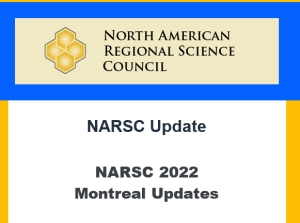

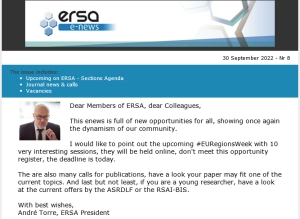

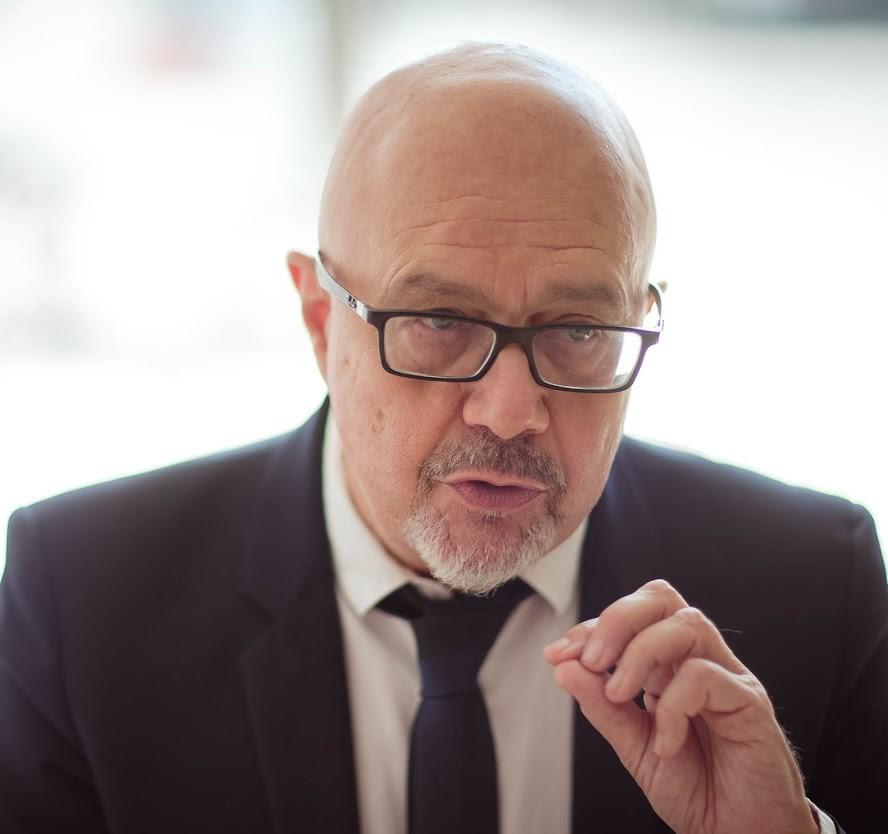 Dear Members of ERSA, dear Colleagues,
Dear Members of ERSA, dear Colleagues,













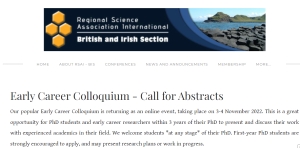
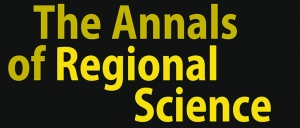
 The Annals of Regional Science.
The Annals of Regional Science. 